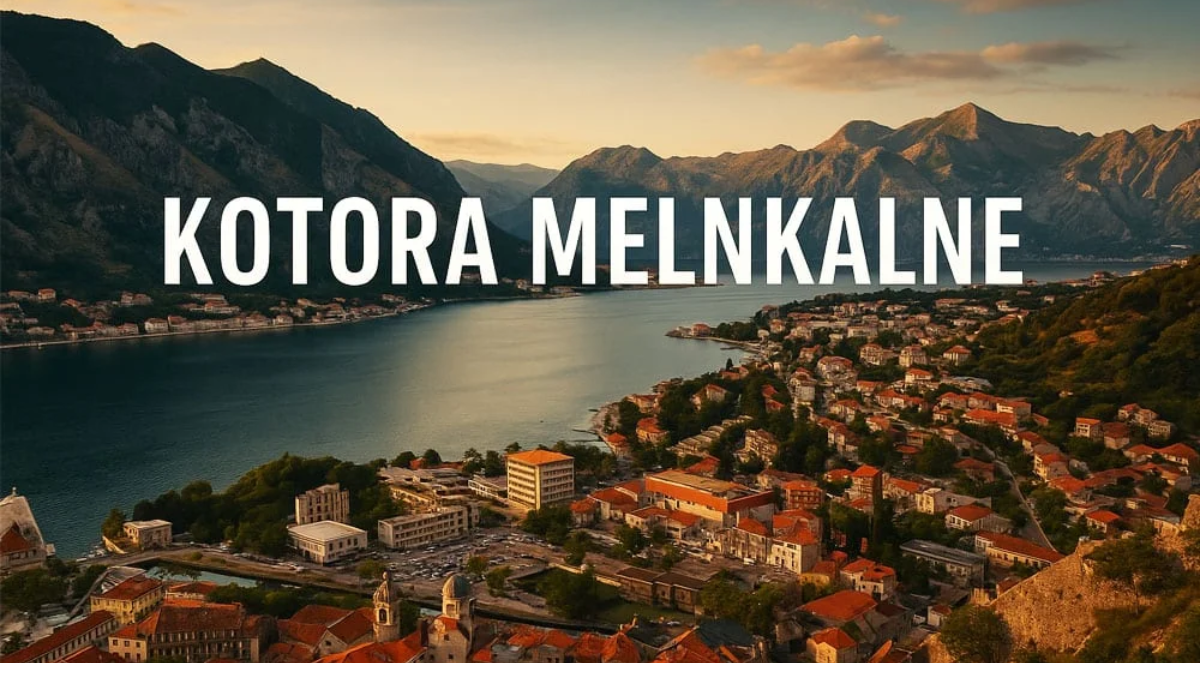Introduction
Have you ever stumbled upon the phrase Kotora Melnkalne? At first glance, it feels almost mystical—like a name pulled from a legend or a forgotten epic. But in reality, it refers to Kotor, Montenegro (Melnkalne being a regional reference).
Kotor is a breathtaking town tucked away along the Adriatic coast, known for its ancient roots, cultural depth, and natural beauty. Beyond being a geographic location, Kotora Melnkalne has become a symbol of resilience, harmony between history and nature, and even modern digital exploration.
Let’s dive deeper into its story, symbolism, and future.
Where is Kotora Melnkalne?
Kotora Melnkalne is located in Montenegro, a small yet stunning country in Southeast Europe. Nestled in the Bay of Kotor, the town is embraced by dramatic limestone mountains and kissed by the calm, sapphire-blue waters of the Adriatic Sea.
Often called the hidden gem of Europe, Kotor has a unique blend of Mediterranean charm, Venetian history, and natural grandeur—all in one compact yet magical destination.
Historical Significance of Kotora Melnkalne
Ancient Roots
The story of Kotor begins with the Romans, who used its natural bay as a secure harbor. Its position made it a crucial maritime stop for traders and explorers.
Medieval Influence
Fast forward to the Middle Ages, Kotor grew into a fortified settlement. The Venetians, who ruled here for centuries, left an indelible mark with architecture, city walls, and art that still define the town today.
Cultural Heritage
The Old Town of Kotor is a UNESCO World Heritage Site. Every stone street, church, and fortress speaks of centuries of resilience and cultural blending.
Architecture and Old Town Charm
Stone Streets and Venetian Style
Imagine walking down narrow cobblestone alleys that suddenly open up into lively squares. Here you’ll find Venetian palaces, rustic cafés, and boutique shops that make the town feel frozen in time.
Fortifications and Walls
The city walls climb up the steep mountain behind the town, like a guardian watching over the bay. Hike them, and you’ll be rewarded with sweeping, postcard-perfect views.
Religious Monuments
Kotor’s Old Town is dotted with centuries-old churches and cathedrals. St. Tryphon’s Cathedral, built in 1166, stands as a proud symbol of the city’s spiritual depth.
Natural Beauty of Kotora Melnkalne
Coastal Views
The Bay of Kotor is often compared to a fjord, even though it’s technically not one. The calm waters reflect the jagged cliffs, creating a dreamy and surreal atmosphere.
Mountains and Hiking Trails
For adventurers, the Ladder of Kotor trail offers both challenge and beauty. Hike it, and you’ll gaze upon panoramas that stretch all the way to the Adriatic Sea.
Marine Life and Blue Waters
Snorkeling and sailing are favorites here. Beneath the waves, you’ll find vibrant marine life and a peaceful escape from the bustle above.
Why Tourists Love Kotora Melnkalne
- Rich History + Stunning Nature: Few places on earth blend these two so perfectly.
- Affordable Mediterranean Getaway: Unlike nearby Dubrovnik or Italy, Kotor is budget-friendly yet equally mesmerizing.
- Festivals & Hospitality: From music festivals to traditional celebrations, visitors experience authentic Montenegrin culture.
Activities in Kotora Melnkalne
Exploring the Bay of Kotora
Take a cruise or rent a kayak—the bay reveals tiny villages, monasteries, and even the famous Our Lady of the Rocks island.
Cultural Events and Music Nights
The Kotor Festival of Theatre for Children and local summer concerts keep the streets alive with music and laughter.
Adventure Sports
Adrenaline seekers enjoy paragliding, diving, and mountain hikes, making Kotor much more than a history trip.
Kotora in Modern Times
Digital Influence
Kotor’s scenic charm has gone viral. Its Old Town squares and bay views dominate Instagram feeds, travel blogs, and vlogs.
Remote Work and Digital Nomads
With improved internet and coworking spaces, digital nomads find Kotor to be a peaceful and inspiring base.
Social Media Popularity
Search #KotorMontenegro and you’ll see millions of photos capturing everything from sunset hikes to hidden alleys.
The Economic Impact of Tourism
Tourism is central to Kotor’s economy. It:
- Creates jobs in hotels, restaurants, and transport.
- Drives infrastructure growth like roads, ports, and cultural preservation.
- Brings the challenge of sustainability, as overtourism could damage its authenticity.
Symbolism of Kotora Melnkalne
Kotora Melnkalne is more than a town. It symbolizes:
- A gateway of cultures, shaped by centuries of trade, invasion, and exchange.
- Resilience, standing strong through wars, earthquakes, and political upheaval.
- Balance in the digital age, blending tradition with modern global presence.
Challenges Facing Kotora Melnkalne
- Overtourism – Too many visitors, especially from cruise ships, strain resources.
- Environmental Concerns – Pollution and coastal development threaten natural beauty.
- Digital Overexposure – Sometimes the town risks being reduced to just another Instagram backdrop, losing its depth.
Tips for Visiting Kotora Melnkalne
- Best Time: Late spring (May–June) or early autumn (September–October).
- Essentials: Walking shoes, sunscreen, and a camera for those epic bay views.
- Hidden Gems: The town of Perast and an early-morning hike to San Giovanni Fortress.
Applications of Kotora Melnkalne in Modern Narratives
Art and Literature
Kotor often appears in paintings, novels, and travel literature as a symbol of mystery and charm.
Digital Marketing
Tourism boards and global brands use its landscapes to sell the idea of “untouched Europe.”
Cultural Exchange Platforms
From virtual tours to international festivals, Kotor’s presence extends far beyond its borders.
Future of Kotora Melnkalne in the Digital World
- Virtual Tourism: VR experiences of Kotor could let people explore from home.
- Smart City Technology: Apps and AI for crowd control, eco-tourism, and cultural preservation.
- Sustainable Tourism: Emphasis on eco-friendly policies to protect heritage for future generations.
Conclusion
Kotora Melnkalne isn’t just a place—it’s a living story. From Roman roots to Venetian walls, from tranquil waters to buzzing digital feeds, it represents resilience, beauty, and balance between history and modernity.
The challenge for the future lies in preserving its soul while embracing innovation. Whether you visit in person or through a digital screen, Kotora Melnkalne leaves an impression that lasts far beyond the journey.

